Data protection will dominate the EU-US summit in Lisbon
Adelina Marini, November 19, 2010
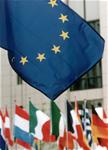 The issues which the European Union wants to raise at the EU-US summit, which will take place on November 20 in Lisbon, are many. The summit will take place within the framework of the Nato summit. More interesting is that it is hard to outline the main priority from the debate in the European Parliament on EU's priorities for the summit.
The issues which the European Union wants to raise at the EU-US summit, which will take place on November 20 in Lisbon, are many. The summit will take place within the framework of the Nato summit. More interesting is that it is hard to outline the main priority from the debate in the European Parliament on EU's priorities for the summit.
The EU will be represented in Lisbon, as usually, by European Council President Herman van Rompuy and the president of the European Commission Jose Manuel Barroso. Both, however, did not attend the debate in Parliament. Instead, those attending were the vice president of the Commission and Commissioner on justice, fundamental rights and citizenship Viviane Reding, and the EU Commissioner on trade Karel de Gucht, who again was wearing the double hat also of a deputy of the High Representative for Foreign Affairs baroness Ashton (just like it happened during the debate before the EU-China summit).
Data protection seems to be the leading issue
The creation of an "umbrella" agreement with the US for data protection will be the leading topic at the summit, which is expected to last an hour and a half. According to the Belgian justice minister Stefaan De Clerck, who spoke on behalf of the rotation presidency, protection and data exchange between the EU and the US is one of the key elements which underpin the European values, enshrined in the Treaties. The problem with the current settlement of the matter is that each country has its own rules for data protection and, when exchange is needed with the US, a permission is being asked for each case separately.
This burdens work very much and this is why the EU hopes the new agreement 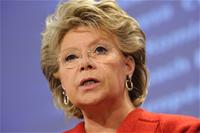 to lay the foundations of an easier and, in the same time, more secure transfer of data across the Atlantic with respect of human rights. On her behalf, Commissioner Viviane Reding explained that this is about an agreement of an "umbrella" type, aimed at protecting personal data and enhancing the rights of individuals. A key element in the negotiations would be the search of a single standard in the data exchange approach, given the differences among states. Leading principles in negotiations, as Ms Reding underlined, would be proportionality, data exchange minimisation, minimal retention periods and purpose limitation.
to lay the foundations of an easier and, in the same time, more secure transfer of data across the Atlantic with respect of human rights. On her behalf, Commissioner Viviane Reding explained that this is about an agreement of an "umbrella" type, aimed at protecting personal data and enhancing the rights of individuals. A key element in the negotiations would be the search of a single standard in the data exchange approach, given the differences among states. Leading principles in negotiations, as Ms Reding underlined, would be proportionality, data exchange minimisation, minimal retention periods and purpose limitation.
Secondly, the new framework agreement should be applicable to all future and existing agreements, dealing with exchange of information by law enforcement. Viviane Reding has another ambition - application of data protection standards and their control by independent public authorities.
In order real negotiations on the new framework agreement to open, however, the Council has to approve Commission's recommendation for beginning of negotiations. This recommendation is still in the Council pending approval. Nonetheless, the main principles and wishes of the EU are already clear and will be laid out before the American partners. According to the EU Commissioner on justice, partnership between the EU and the US in the area of security is of great importance for Europe.
Economic development via cooperation and without protectionism
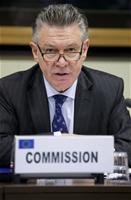 EU Commissioner on trade Karel de Gucht announced before MEPs that economy and jobs would be in the heart of the discussions during the summit. First a review of the outcomes of the G20 summit in Seoul would be made and then, the respective contributions of both sides for a sustainable and balanced global recovery will be discussed. Mr De Gucht underlined that the EU would insist protectionist measures to be resisted both at home and abroad. The Commissioner, however, did not mention even a word about the tension, caused in global economy by the decision of the Federal Reserve to print another $600 bn for the economy, thus trying to stimulate real-estate market and to additionally devalue the dollar.
EU Commissioner on trade Karel de Gucht announced before MEPs that economy and jobs would be in the heart of the discussions during the summit. First a review of the outcomes of the G20 summit in Seoul would be made and then, the respective contributions of both sides for a sustainable and balanced global recovery will be discussed. Mr De Gucht underlined that the EU would insist protectionist measures to be resisted both at home and abroad. The Commissioner, however, did not mention even a word about the tension, caused in global economy by the decision of the Federal Reserve to print another $600 bn for the economy, thus trying to stimulate real-estate market and to additionally devalue the dollar.
Nevertheless, several MEPs raised the issue and even insisted the EU to be adamant in its position that actions like printing more money by the Fed are as worrying as the depreciation of the renminbi. The most acute in his position was the Austrian MEP Hannes Swoboda from the group of the Progressive Alliance of Socialists and Democrats.
"We have to be aware that as of the 2nd of November [when the first mid-term 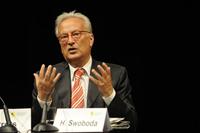 elections took place in the US and the Democrats lost their majority in the House of Representatives] the world is a different place. We haven't got to an ideal cooperation with the US before then but it now looks as though things will be more difficult. [...] It's quite right that the US has to balance its budget again. I think it's a good thing the US is trying to create new jobs. That's good for them and it's good for us. However, it has to be done in a coordinated fashion", Mr Swoboda underlined and added that the Americans must be left with the impression that the Europeans are not entirely dependent on them.
elections took place in the US and the Democrats lost their majority in the House of Representatives] the world is a different place. We haven't got to an ideal cooperation with the US before then but it now looks as though things will be more difficult. [...] It's quite right that the US has to balance its budget again. I think it's a good thing the US is trying to create new jobs. That's good for them and it's good for us. However, it has to be done in a coordinated fashion", Mr Swoboda underlined and added that the Americans must be left with the impression that the Europeans are not entirely dependent on them.
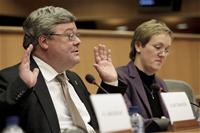 The change of composition in the House of Representatives in the American Congress was a focus in the statement of Reinhard Boetikofer, an MEP from the group of the Greens in the Europarliament. He said that "the elections on the 2nd of November formed an important event in modern American history and we would interpret it as the country just posing for breath and what is more important, given that backdrop, that we have reliable cooperation and that we signal our desire for that and set priorities for our future work".
The change of composition in the House of Representatives in the American Congress was a focus in the statement of Reinhard Boetikofer, an MEP from the group of the Greens in the Europarliament. He said that "the elections on the 2nd of November formed an important event in modern American history and we would interpret it as the country just posing for breath and what is more important, given that backdrop, that we have reliable cooperation and that we signal our desire for that and set priorities for our future work".
The MEP from Cyprus, Ioannis Kasoulides, from the majority group, EPP, had an even more global approach by saying: "The world's gravity centre is steadily shifting from the west towards the east with the emergence of new global powers like China and India. [...] The transatlantic partnership, from an alliance of necessity during the cold war, has evolved to an alliance of choice. The emergence of a multipolar world dictates the need for a new definition of modalities for cooperation between the two sides for all existing bilateral and global issues. [...] The transatlantic partnership should concentrate on maximising the potential benefits of our economic relationship with the reinforcement of the Transatlantic Economic Council. Unilateral actions like the QE2 taken by the Fed is as worrying as the depreciation of the renminbi".
For finding a solution with regard to the printing of $600 bn called another MEP 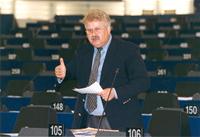 from the EPP group, the German Elmar Brok. He focused also on the fact that around 60% of global GDP is being formed by the US and the EU, which is why it was necessary standards to be developed. With regard to financial market "we have to make a decision on the 600 bn dollars being put into the market place and there are certain fears about inflation and others are concerned what might happen in the world economy and that economic relationships around the world could go adrift".
from the EPP group, the German Elmar Brok. He focused also on the fact that around 60% of global GDP is being formed by the US and the EU, which is why it was necessary standards to be developed. With regard to financial market "we have to make a decision on the 600 bn dollars being put into the market place and there are certain fears about inflation and others are concerned what might happen in the world economy and that economic relationships around the world could go adrift".
Climate change
MEPs asked the EU to press the American counterparts for the achievement of a long-standing and legally binding agreement on climate change at the Cancun (Mexico) conference in December. In the beginning of the debate Commissioner Karel de Gucht said the EU would press the US for the need the Cancun conference to be a step toward reaching a global framework for dealing with climate change.
The Bulgarian MEP from the group of the Alliance of Liberals and Democrats for Europe Vladko Panayotov said that after president Obama had been elected the EU-US relations had entered a new phase of a durable cooperation, and "the Cancun summit will be an excellent opportunity to remind the US of that and bring other parties toward a durable agreement. The current agreements will expire in two years and we need a certain amount of time to adopt new agreements. We should also send a clear signal to emerging countries about technology transfer".
Karel de Gucht, however, was skeptical by saying that the new majority in the House of Representatives would probably limit president Obama's room for maneuvers in the area of climate change. What the EU would fight for is at least the US not to backtrack on its Copenhagen commitments. According to the Commissioner, though, Europe can advance on concrete issues such as fast start finance, reducing emissions and facilitation of adaptation to climate change for pour and developing countries.
Visa waivering
MEPs also raised the issue of including four EU member states in the American visa waivering programme (Bulgaria, Cyprus, Poland and Romania). Commissioner De Gucht responded that the EU attaches a lot of importance to their admission and will continue working with the US counterparts on solving this issue. After the debate the MEPs approved a resolution in which they insist that the EU must negotiate as a single entity on admission to the US visa waiver programme. The document also insists bilateral agreements with the US to gain visa waiver status not to be concluded.
As part of this is the concern, underpinned in the resolution, about the so-called Travel Promotion Act, and its discriminatory impact in applying only to travellers under the US visa waiver programme. "The Commission has repeatedly voiced concern that these new requirements are inconsistent with the commitments of the US to facilitate transatlantic mobility and constitute an additional burden for European citizens travelling to the US", the Commissioner on trade said in response to this concern.
Foreign policy
The Romanian MEP from the group of socialists and democrats Adrian Severin raised the issue about the foreign policy aspect of the negotiations between the EU and the US. He also paid attention to the different context in which the summit will take place by saying that things would get a little bit more complicated (given the change of composition in the House of Representatives in the American Congress). He said that the EU should convince its American allies that the multilateral approach must be maintained in international relations. Furthermore, Mr Severin called on the EU to insist on the development of a civilian dimension of peace enforcement and peace-keeping missions, as well as the crisis management and post crisis rehabilitation operation should be kept.
Part of this process, he said, was the ratification of the new START Treaty which is still pending approval in the Senate. "The US announced an already reset relations with Russia has also to go on. I think that this reset is very important to us. And it is also important if we look forward at a trilateral dialogue - Russia-EU-US on the most important global topics", Adrian Severin added, who is a former foreign minister of Romania.
Reinhard Boetikofer called on the EU to emancipate from the US by following its own interests. "With a weakened president and tented isolationism in the US, it's going to be ever more important for the EU to pursue its own independent international initiatives, for example the Middle East", he explained.
Several MEPs raised the issue about the leaked secret documents from the war in Iraq in the website Wikileaks. This is why the issue has been included in the resolution of the Parliament: "Although aware that the leaking of classified military documents runs the risk of endangering military personnel, is highly concerned at the recent serious allegations that torture has been condoned in Iraq; calls for this issue to be raised at the EU-US summit with a view to an independent transatlantic inquiry".
In the resolution and during the debate a lot more issues were raised from the transatlantic, as well as the global agenda. Still it is not clear what part of these issues will be taken into account in the overall time of the summit (an hour and a half), given that there is no unanimity in the EU which one of all the topics should be the main one. euinside will follow the summit and inform you about the key moments in it.
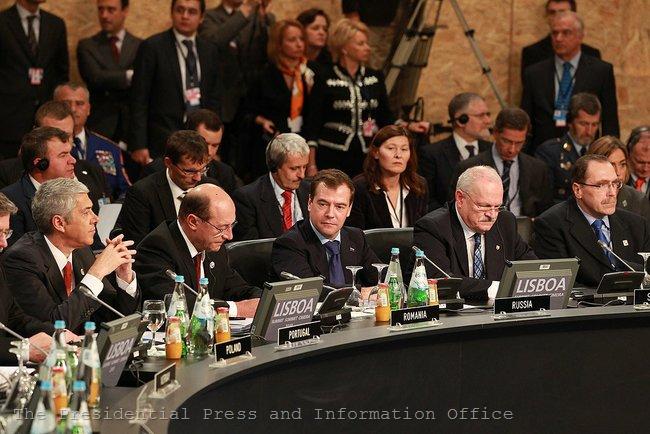 | © The Presidential Press and Information Office
| © The Presidential Press and Information Office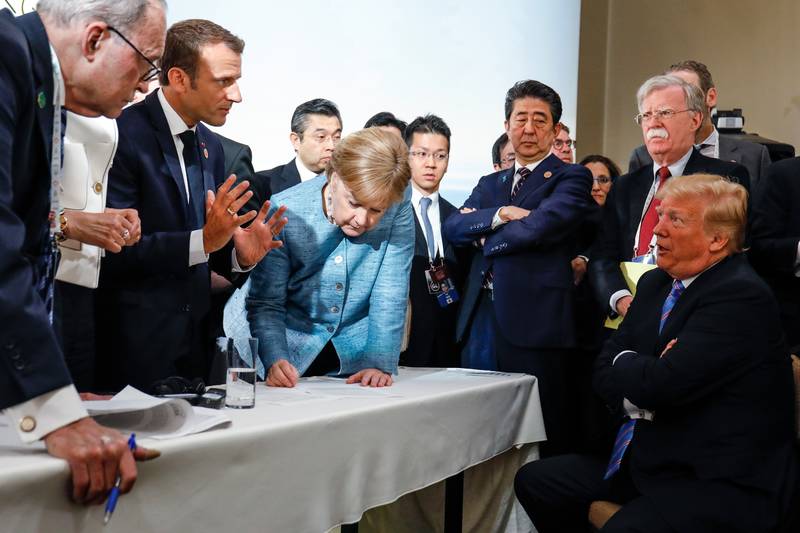 Macron, Merkel, Abe, Trump | © Council of the EU
Macron, Merkel, Abe, Trump | © Council of the EU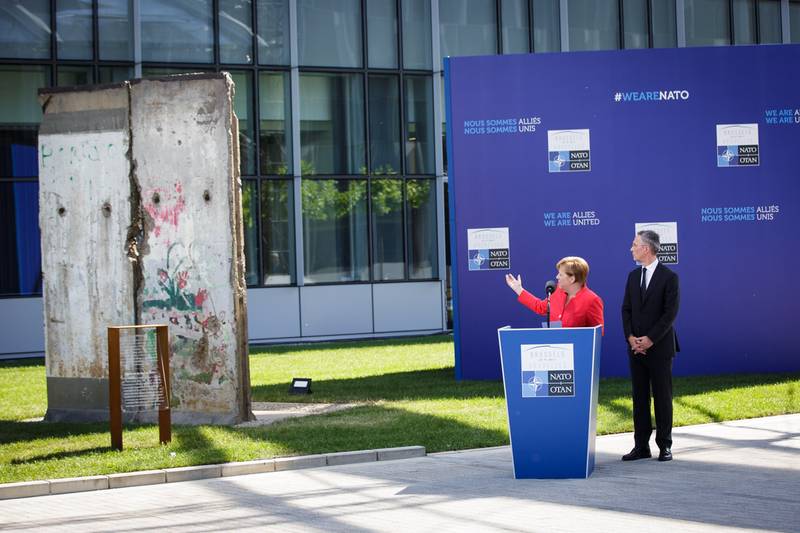 Angela Merkel | © Bundesregierung
Angela Merkel | © Bundesregierung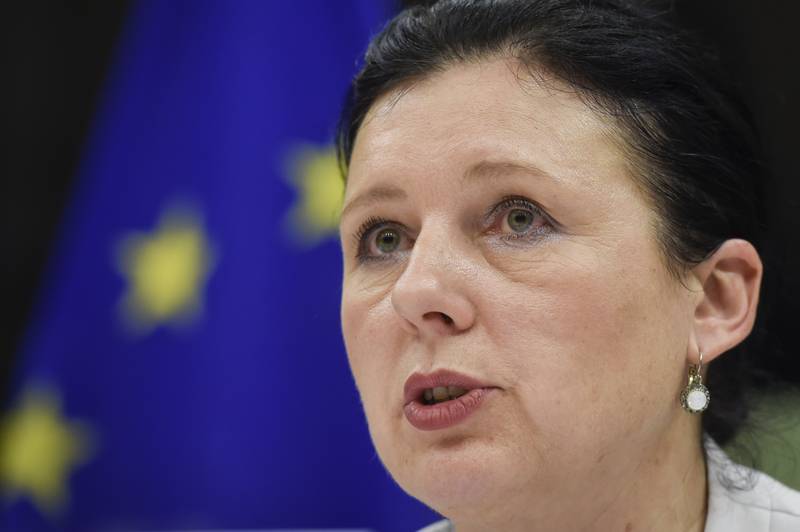 Vera Jourova | © European Parliament
Vera Jourova | © European Parliament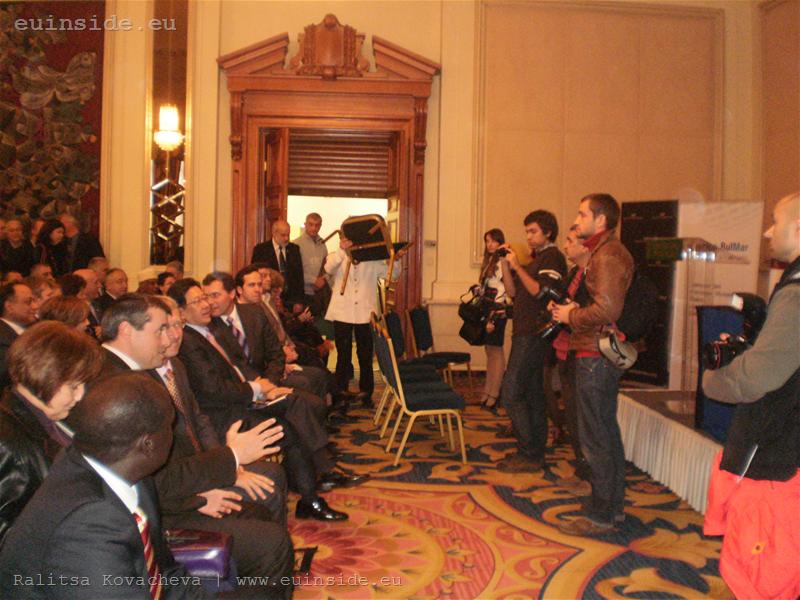 | © euinside
| © euinside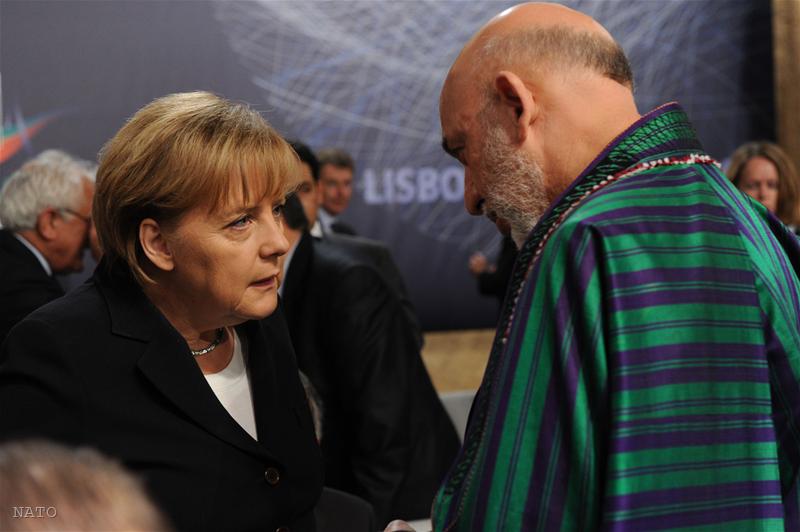 | © NATO
| © NATO